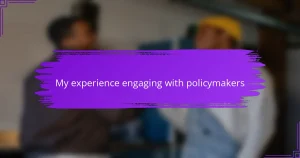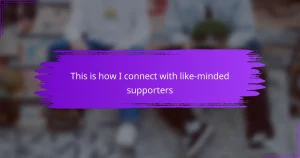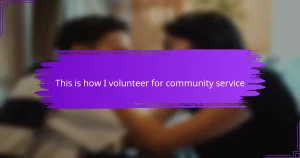Key takeaways
- Civic engagement involves feeling connected to the community and taking active steps, such as volunteering and participating in discussions, to foster change.
- Communities that engage collectively tend to become more resilient, showcasing the tangible benefits of civic participation on local issues.
- Encouraging others to participate in civic activities can be achieved through simple conversations, sharing experiences, and creating welcoming spaces for involvement.
- Small acts of civic involvement can lead to significant societal change, emphasizing the importance of individual contributions to the broader community.
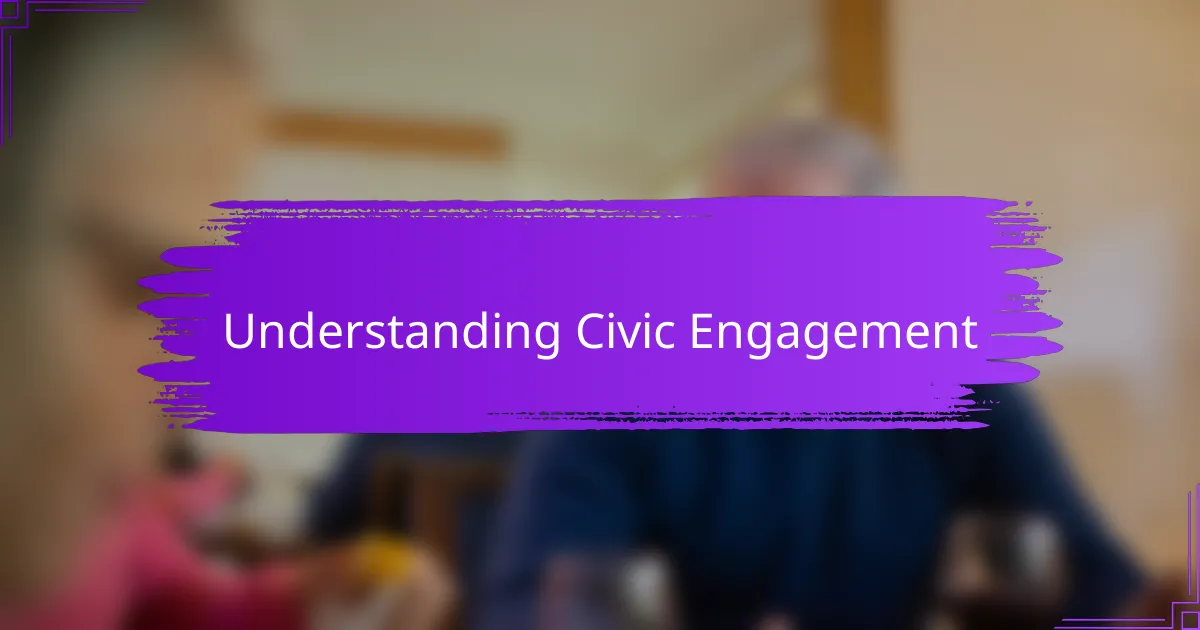
Understanding Civic Engagement
Civic engagement, to me, means more than just voting or attending a town hall meeting—it’s about feeling connected to the community and believing that your voice truly matters. I’ve seen firsthand how small acts, like volunteering or simply staying informed, can ripple out and create real change. Have you ever noticed how just discussing local issues with friends can spark a deeper sense of responsibility?
What strikes me is how civic engagement often feels personal and emotional. When I participated in a neighborhood clean-up, it wasn’t just about picking up trash—it was about reclaiming a shared space and showing pride in where we live. This hands-on involvement made me realize that civic duty isn’t an abstract concept; it’s tangible and fulfilling.
Isn’t it fascinating how civic engagement bridges individual actions with collective progress? It’s a reminder that democracy thrives not just on policies but on people actively caring and participating in the life of their communities. I find this profoundly inspiring and a call to keep pushing forward together.
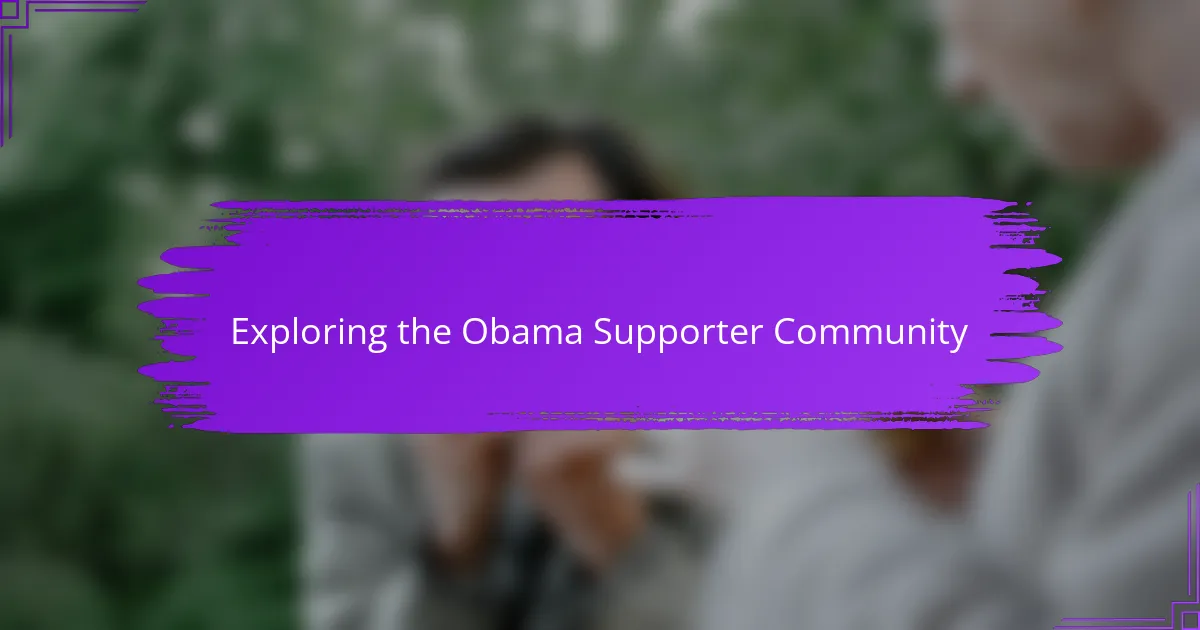
Exploring the Obama Supporter Community
Exploring the Obama supporter community, I’ve noticed a unique blend of optimism and determination that fuels their civic engagement. It’s not just political loyalty; it’s a shared belief in hope and change that brings people together in a meaningful way. Have you ever felt that spark when conversations shift from politics to real-life stories of impact within this group?
One moment that stands out to me was attending a local meet-up where the passion for community organizing was palpable. Everyone wasn’t just there to support a figurehead—they were committed to making their neighborhoods better, inspired by the example set during Obama’s presidency. That feeling of collective purpose reminded me why being part of such a community matters deeply.
What truly resonates is how this community balances respect for differing opinions with a unified vision for progress. I see a willingness to listen, learn, and act that goes beyond typical political circles. Could this be why civic engagement feels so alive and empowering among Obama supporters? To me, it certainly feels that way.
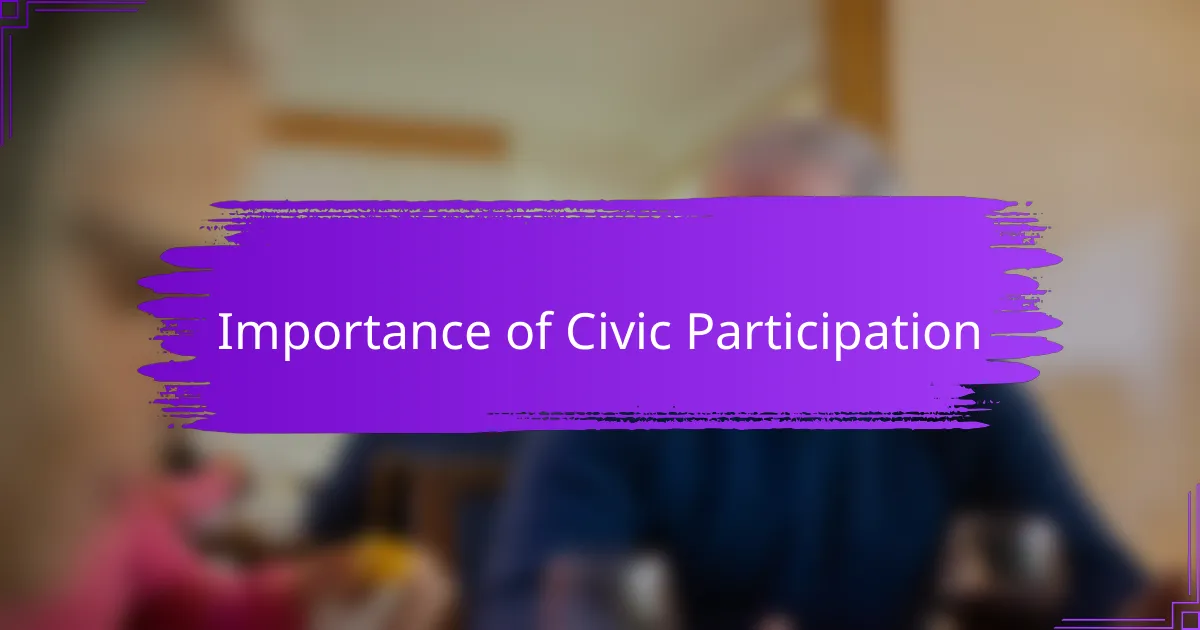
Importance of Civic Participation
When I think about why civic participation matters so much, it’s clear to me that it’s the foundation of a healthy democracy. Without people stepping up to vote, volunteer, or simply voice their concerns, the system loses its connection to real lives. Have you ever wondered what would happen if everyone just stayed silent? From my experience, silence only leads to apathy and missed opportunities for change.
There’s something deeply empowering about knowing that your involvement, no matter how small, contributes to shaping the community around you. I recall feeling a surge of purpose after attending a neighborhood forum, realizing that my opinions and actions could actually influence local policies. This personal wake-up call made me see civic participation not as an obligation, but as an opportunity to cultivate hope and progress.
Moreover, civic involvement fosters a sense of belonging that’s hard to find elsewhere. When I participated in a voter registration drive, I wasn’t just ticking a box—I was joining a collective movement toward fairness and inclusion. Isn’t that the kind of connection that fuels sustained change? To me, it’s proof that civic participation is not only important, it’s essential for a vibrant, responsive society.
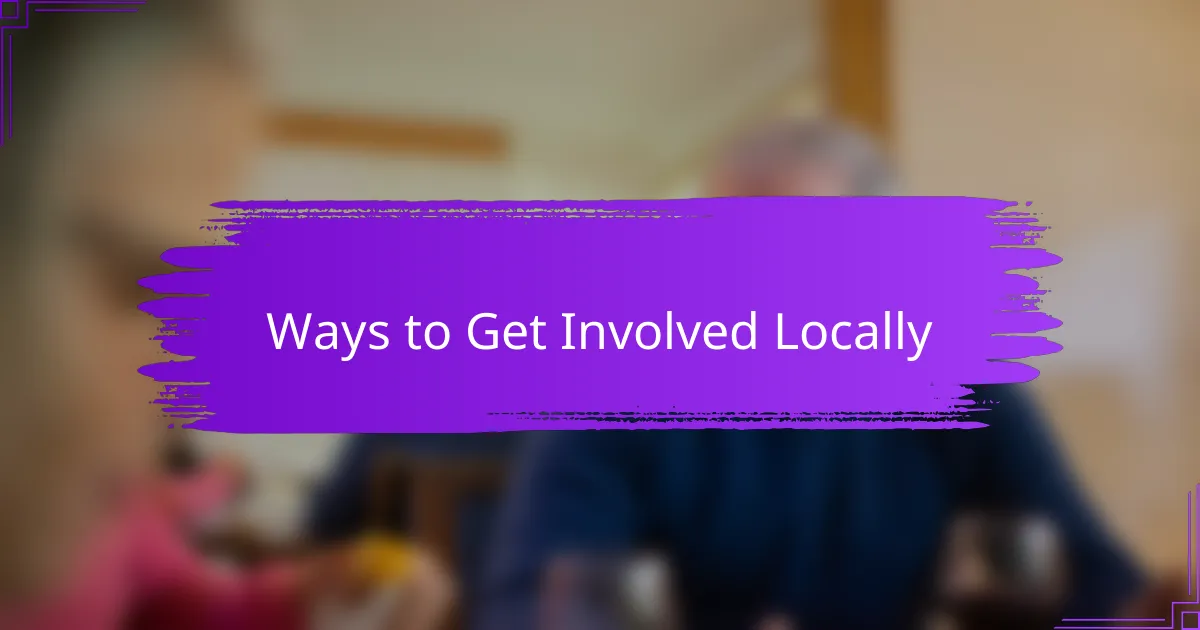
Ways to Get Involved Locally
One of the most accessible ways to get involved locally is by joining community groups or neighborhood associations. I remember the first time I attended a local meeting—it felt like stepping into a room full of people who genuinely cared about where we live. Have you tried it? Engaging with neighbors who share your concerns can ignite a passion for local issues you didn’t expect.
Volunteering for local causes also offers a hands-on way to make a difference. Whether it’s helping out at a food bank or organizing park clean-ups, these activities build connections and create immediate impact. In my experience, getting your hands dirty in community work transforms abstract ideas about change into something real and rewarding.
Don’t underestimate the power of showing up at town halls or school board meetings. Speaking your mind or even listening to others’ viewpoints helps shape decisions that affect daily life. I used to think these meetings were dull, but after attending a few, I realized they’re opportunities to hold leaders accountable and bring fresh perspectives into the conversation. Have you ever spoken up at one? It’s surprisingly empowering.
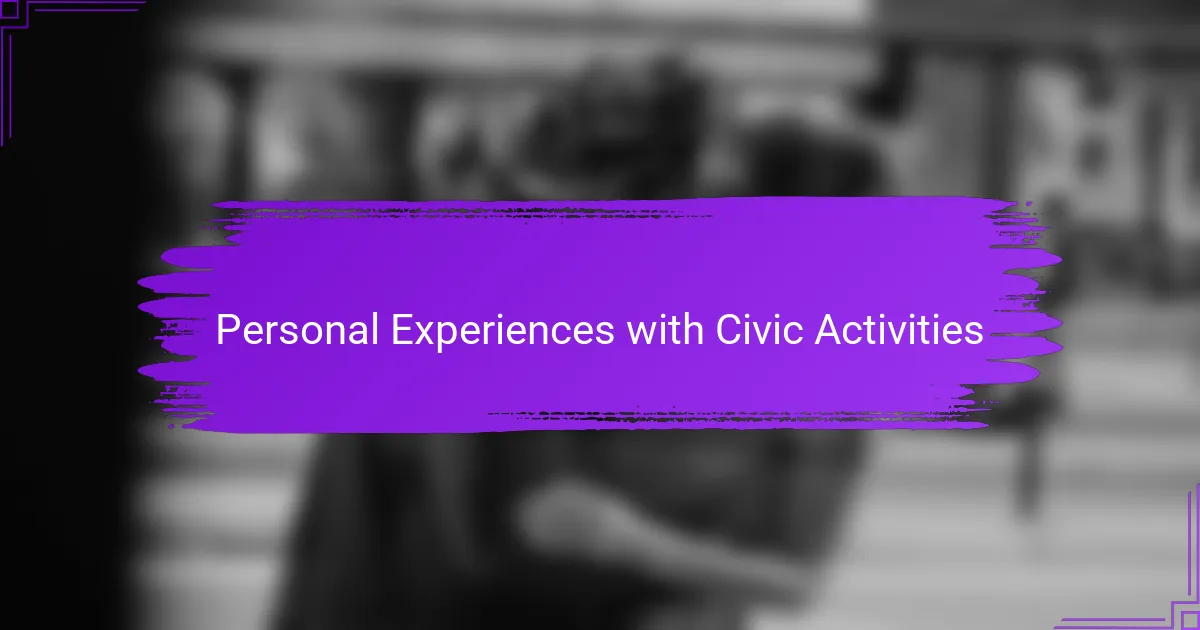
Personal Experiences with Civic Activities
One memorable experience was volunteering for a voter registration drive during an election season. Seeing firsthand how nervous some first-time voters were, and then watching their faces light up after registering, made me realize the profound impact of simply enabling people to participate. Have you ever witnessed that kind of quiet empowerment?
Another time, I got involved in organizing a community discussion about local environmental issues. The passion and knowledge people brought to the table surprised me—it was more than just talk; it felt like we were planting seeds for real, lasting change. It made me wonder, how often do we underestimate the power of our own neighborhoods?
Sometimes, civic activities have been as simple as reaching out to neighbors or sharing information online. These small gestures reminded me that engagement doesn’t require grand gestures; it’s about consistent, meaningful connections. Isn’t it encouraging to think that even small steps can add up to something bigger?
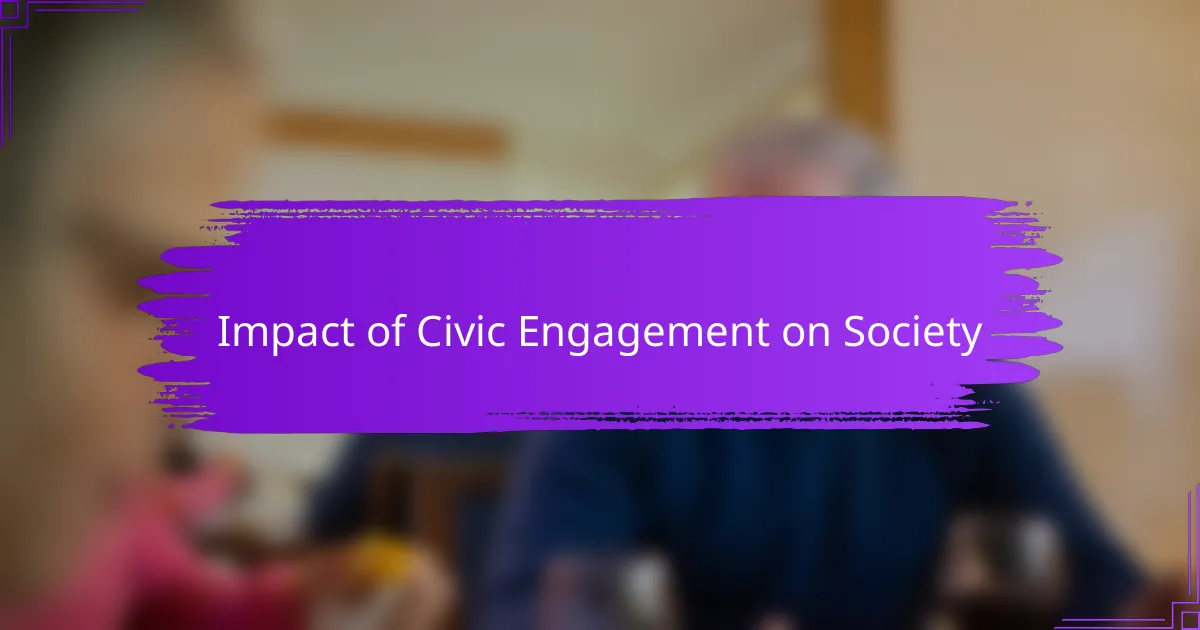
Impact of Civic Engagement on Society
Civic engagement truly shapes the fabric of society in ways we might not always see immediately. From my experience, when people step up and participate, communities become more resilient and connected. Have you noticed how neighborhoods with active citizens tend to have stronger support networks and a greater sense of trust?
I once observed how a simple neighborhood association, energized by a few dedicated individuals, sparked improvements in local schools and parks. It was inspiring to see how collective action translated into tangible benefits that improved daily life for everyone. Doesn’t that make you think about the power each of us holds when we choose to engage?
On a broader scale, civic engagement fosters social equity and accountability. When citizens demand transparency and fairness, governments and institutions respond more effectively. I believe this dynamic not only strengthens democracy but also ensures that progress reflects the diverse needs of the community. How often do we remind ourselves that sustained involvement is the key to lasting societal change?
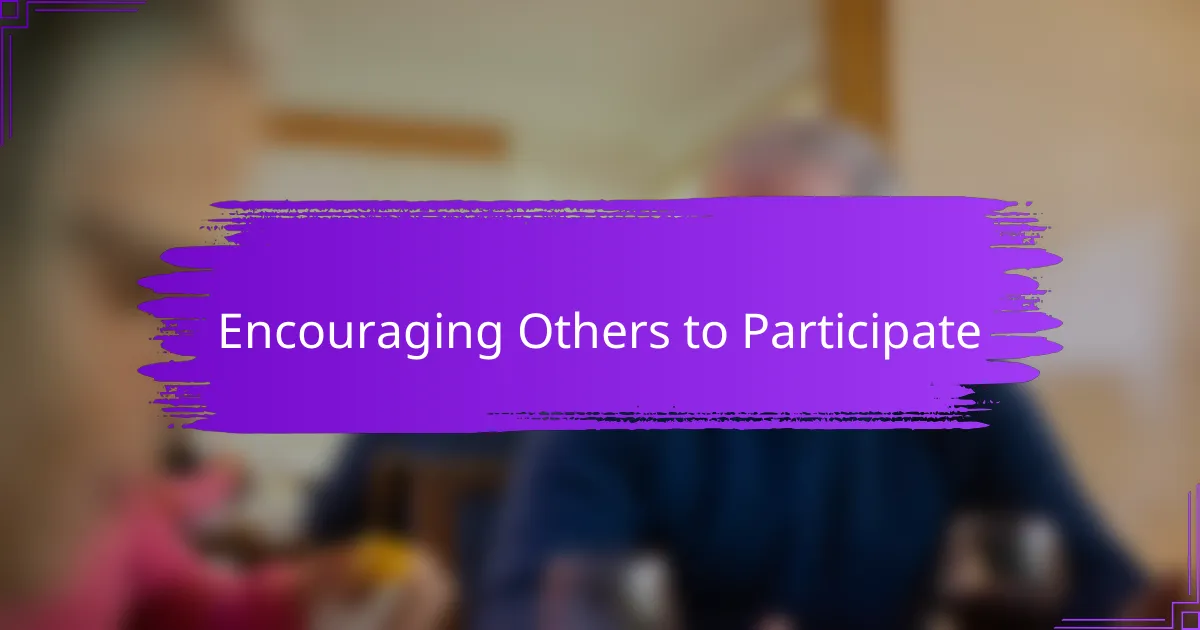
Encouraging Others to Participate
Encouraging others to participate often starts with a simple conversation. I’ve found that sharing my own experiences and why I care can spark curiosity and motivate friends or family members to get involved. Have you ever noticed how enthusiasm is contagious once someone feels genuinely heard and inspired?
Sometimes, it’s about breaking down barriers and making participation feel achievable. When I helped a friend register to vote, the relief and excitement on their face reminded me how important it is to offer support and guidance to those who might feel intimidated or unsure. Could a little encouragement from us be the nudge someone needs to step forward?
What really matters to me is creating a welcoming space where people feel their contribution counts, no matter how small. I remember organizing a neighborhood event and seeing hesitant neighbors gradually join in—it was powerful to witness how inclusion builds momentum. Isn’t that the essence of community engagement, after all?
